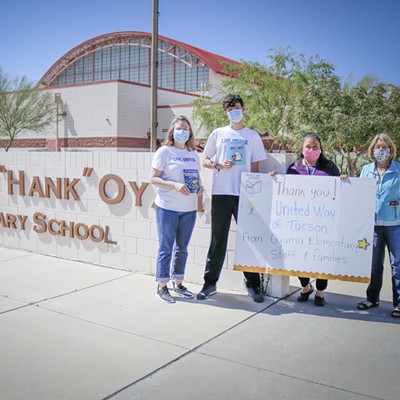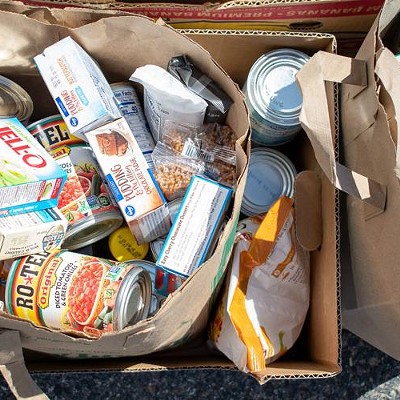Chris Wilke stands in an upstairs apartment, amid a clay press, whimsical molds and rows of terra cotta tiles elegantly imprinted with leaves and flowers. Those tiles will eventually be fitted onto benches, to adorn a bucolic pocket park in the UA-area Rincon Heights Neighborhood.
Life in the shadows of an ever-expanding educational behemoth offers its challenges, with protection of neighborhood integrity foremost among them. That's precisely where this collaborative park effort comes in. Funded with a $5,000 grant from an organization called PRO Neighborhoods—short for People, Resources and Organizations in Support of Neighborhoods—it's been a boon for creating ties among residents.
"A lot of people are quite invested in it," Wilke says. "They're learning a skill, as well as participating with their neighborhood."
She pauses, gently lifting a tile from the floor. "We're creating stuff here that we can use time and time again. Not only will this be a one-time project for our neighborhood, but we can also use these molds to create tiles for projects in other neighborhoods."
Rincon Heights residents might consider their timing quite fortunate, after news recently emerged that PRO Neighborhoods is on the rocks. Despite the program's successful, 18-year run of funding local projects, the United Way of Tucson and Southern Arizona, along with other founding partners—the Community Foundation for Southern Arizona, the city of Tucson and Pima County—appear ready to pull the plug.
The reason tossed out for public consumption—the PRO Neighborhoods budget has run dry—is certainly true enough, but critics wonder why the nongovernment partners, with all their fundraising expertise, hadn't thought up a Plan B. Instead, skeptics say, this appears to be demise by design.
For instance, it's long been understood that PRO Neighborhoods' only remaining funding source, a $586,743 stimulus grant, was good just through March.
"This financial challenge didn't just come up in the last three weeks," says Rincon Heights resident Mark Homan, who was involved with the creation of PRO Neighborhoods back in 1994. "If you were a fan of keeping the program alive, you don't sit there and say, 'Well, gee, there's this financial crunch—I hope that something happens.'"
That apparent planning gap has led to speculation among many people interviewed for this story that the United Way and the Community Foundation hope to see PRO Neighborhoods simply fade away—a supposition vigorously denied by officials from both organizations.
The current crisis is bitter tea for longtime PRO supporters such as Homan. He helped plant the program's seeds in the early 1990s, joining other activists to score a hefty grant from the progressive-minded Charles Stewart Mott Foundation. "The intent of that grant," Homan says, "was to assist in the development of neighborhoods that were not already organized." This included workshops on everything from mobilizing community groups to conflict resolution.
When that clicked, thoughts turned to making the effort permanent. "So PRO grew directly out of that," Homan says. It flourished in subsequent years, conducting workshops in communities ranging from metro Tucson to the Tohono O'odham Nation, and providing small grants for scores of projects such as the Rincon Heights garden.
PRO's downslide appears to have begun last fiscal year, when the cash-strapped city of Tucson cut its funding contribution to zero. While the United Way continues to provide administrative support—valued at around $50,000 annually—its direct funding was also eliminated in fiscal year 2011. Pima County has continued to contribute roughly $80,000 per year, and the Community Foundation chips in with $25,000 annually. Still, that's not enough to pay the $205,000 in staff costs.
And yet ... an endowment created by the United Way and the Community Foundation in 1999 now contains approximately $400,000, with about $45,000 in spendable income. The grant budget for the current fiscal year is $223,000.
So what is really driving PRO's downfall? Some speculate that the United Way simply no longer wishes to foot that bill, although those staffing costs don't total much more than the salary paid to the United Way's former CEO, who resigned two years ago amid scandal. Still, PRO Neighborhoods is hardly the kind of cash cow the United Way has found in children-oriented First Things First. In fiscal year 2010 alone, that statewide program garnered the local United Way nearly $500,000 in administrative fees.
Others suggest that this shrinking support is driven by the business community's unhappiness with neighborhood groups—and PRO Neighborhoods by extension—over constant rezoning scraps. That certainly seems a possibility, given the United Way's symbiotic relationship with Tucson's corporate community.
However, current United Way CEO Tony Penn calls that pure speculation, saying he's "not aware of any negative" buzz about PRO coming from business leaders. "My decision was strictly based on the fact that we have made a very aggressive effort, in my opinion, to maintain the program over the years—and even more so in recent times, because we knew the grant was about to run out."
He notes that the funding partners have even extended the life of PRO Neighborhoods to June—three months beyond the end of its stimulus grant.
Still, the extent of these efforts is hardly transparent to community members worried about PRO Neighborhoods' precarious future. Instead, as news of PRO's dilemma dribbled out, the United Way went into bunker mode. When I tried to interview PRO Neighborhoods executive director Lana Bruno by phone, I was told she wasn't allowed to comment. When I later visited the organization's downtown offices and attempted to interview Bruno in person, I was stonewalled and locked out of the PRO Neighborhood offices.
I'm hardly alone. Numerous community activists have contacted the United Way, hoping to participate in efforts to save PRO, only to be told no thanks by Kathy Wilson, United Way's seniors director.
The activists include Mark Homan. "I was never invited to discuss the program," Homan writes in an email to the Weekly. "I don't know if any other folks have been invited, but all (people) I know who have offered to help have been rejected or put on hold. This includes a number of good, creative people."
Meanwhile, there is some interest on the City Council in funding PRO Neighborhoods. "It will definitely be part of the budget discussion," says Ward 3 Councilwoman Karin Uhlich. "I think that it's going to be a challenge to dedicate city resources to anything but core services. ... But if we can be creative about how the city might participate, there's going to be some good possibilities."











